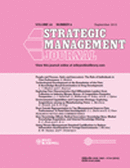Field Experiments in Strategy Research
|
Article: view here
|
Citation:
Chatterji, Aaron, Michael G. Findley, Nathan M. Jensen, Stephan Meier, and Daniel L. Nielson. 2016. "Field Experiments in Strategy Research." Strategic Management Journal 37(1): 116--132. Abstract: Strategy research often aims to empirically establish a causal relationship between an independent variable and a dependent variable such as firm performance. For many important strategy research questions, however, traditional empirical techniques are not sufficient to establish causal effects with high confidence. We propose that field experiments have potential to be used more widely in strategy research, leveraging methodological innovations from other disciplines to address persistent puzzles in the literature. We first review the advantages and disadvantages of using field experiments to answer questions in strategy. We define two types of experiments, “strategy field experiments” and “process field experiments,” and present an original example of each variety. The first study explores the liability of foreignness and the second study tests theories regarding corporate culture.
Google Scholar Citations Replication Data: TBA
Appendix: TBA Registration: Preregistered with EGAP registry (here as study [28] 20130731); Preregistration document applies to this article and others still in development. |
